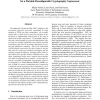Free Online Productivity Tools
i2Speak
i2Symbol
i2OCR
iTex2Img
iWeb2Print
iWeb2Shot
i2Type
iPdf2Split
iPdf2Merge
i2Bopomofo
i2Arabic
i2Style
i2Image
i2PDF
iLatex2Rtf
Sci2ools
125
click to vote
FCCM
2004
IEEE
2004
IEEE
Virtual Memory Window for a Portable Reconfigurable Cryptography Coprocessor
Reconfigurable System-on-Chip (SoC) platforms that incorporate hard-core processors surrounded by large amounts of FPGA are today commodities: the reconfigurable logic is often used to speed up execution of applications by implementing critical parts of the code as application-specific coprocessors. Cryptography applications are a good example of coprocessor applications: they are known to benefit significantly from spatial execution in hardware and have an increasing importance for mobile and ubiquitous computing. One of the main limits of FPGA-based coprocessors for these systems is the fact that both the coprocessor hardware description and the software program invoking are inevitably ridden with system details of the specific interface FPGA/processor: this limits significantly design reuse, impacts time-to-market, and makes development more complex. In this paper we present a portable reconfigurable cryptography coprocessor designed for a Virtual Memory Window (VMW) system. A VMW ...
Coprocessor | Cryptography Application | FCCM 2004 | Reconfigurable Cryptography Coprocessor | VLSI |
| Added | 20 Aug 2010 |
| Updated | 20 Aug 2010 |
| Type | Conference |
| Year | 2004 |
| Where | FCCM |
| Authors | Miljan Vuletic, Laura Pozzi, Paolo Ienne |
Comments (0)

